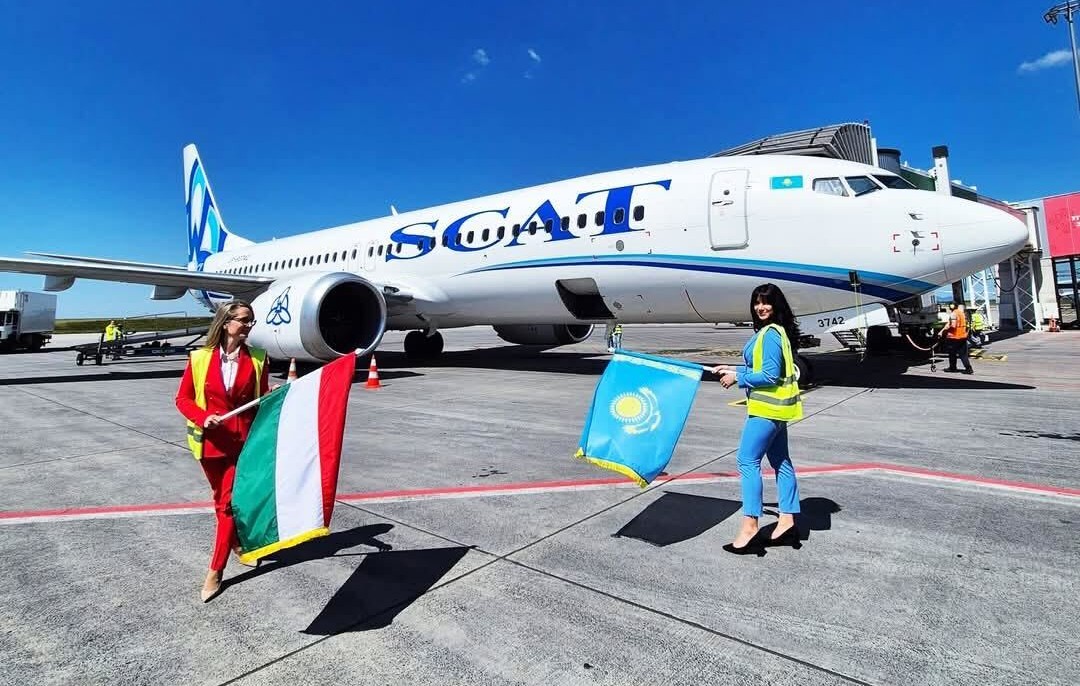Newest flight between Budapest and Central Asian city launched

The Ferenc Liszt International Airport in Budapest ceremoniously received the inaugural scheduled flight from Shymkent, operated by the Kazakh airline “SCAT.” The commencement of this direct air connection was marked by a symbolic ribbon-cutting ceremony at the aircraft stairs, signifying a new chapter in Kazakh-Hungarian relations.
In honour of this important milestone, a press conference was held with the participation of local media representatives and members of the business community.

In his address, Ambassador of the Republic of Kazakhstan to Hungary, H.E. Mr. Abzal Saparbekuly, emphasised that the launch of the direct flight will serve as a catalyst for deepening bilateral cooperation in such key areas as trade, investment, tourism, culture, and humanitarian exchange. He noted that the warm and trusting relations between the two countries laid a solid foundation for the successful official visit of the President of the Republic of Kazakhstan, H.E. Mr. Kassym-Jomart Tokayev, to Hungary in November of the previous year, at the invitation of Prime Minister Viktor Orbán.

The Ambassador further highlighted that only recently, President Tokayev again visited Budapest to participate in the informal summit of the Organisation of Turkic States — all of which reflects the special significance both sides attribute to advancing the bilateral partnership.
In turn, Mr. Nikolai Buryakov, Commercial Director of SCAT Airlines, underscored the dynamic development of bilateral relations and the airline’s role in enhancing air connectivity between Kazakhstan and Hungary. He shared key details about the new route with journalists, noting that direct flights between Shymkent and Budapest will operate twice a week — on Tuesdays and Saturdays. The schedule, he said, is designed for convenience, and the fares remain competitive, making the route attractive to both tourists and business travellers.

State Secretary for Parliamentary Affairs and Deputy Minister, Ministry of Foreign Affairs and Trade of Hungary, Mr. Levente Magyar, stated that the expansion of tourism and humanitarian exchange between the two countries has been made possible thanks to a favorable political climate and the two sides’ active cooperation on the international stage — including the informal OTS summit of heads of state recently held in Budapest.
“We’re talking about a region covering millions of square kilometres, home to hundreds of millions of people, with developing military potential and enormous economic prospects. Because of these advantages, the world’s major powers are all seeking cooperation with these countries,” he pointed out.
“Let’s not forget that these states share vast reserves of natural resources—from which Hungary, like many other European countries, also benefits. So it cannot be overstated how important our deepening relationship with the Organisation of Turkic States is. Today, we even participate as an observer,” he added.

Magyar noted that Kazakhstan, a country of immense territory and rich in natural resources, plays a particularly important role within the group. Hungary has maintained strong bilateral relations with Kazakhstan for a long time.
“Hungary has long aimed to establish direct air connections with all its key partners, including Kazakhstan. Direct flights not only enable physical connectivity but also drive movement, tourism, and academic interest. Even now, around 250 Kazakh students come to Hungary each year under a government scholarship program,” he explained.
The deputy minister also underlined that such direct connections can significantly boost business relations. He noted that direct flights are already in place with Azerbaijan and several with Türkiye, and work is ongoing to establish a route to Uzbekistan.
“We thank SCAT Airlines for choosing Hungary as their first destination in Central Europe. This reflects everything I’ve spoken about—the special relationship between Hungarians and Kazakhs. It shows that we see the Turkic states as strategic partners, and they see us the same way. There is a healthy reciprocity in this relationship,” he continued.
“I have high hopes that this flight will be viable in the long term, and that the current twice-weekly service will soon increase to five flights per week. This will hopefully pave the way for even more routes between Kazakhstan and Hungary,” he concluded.
In conclusion, the event participants expressed confidence in the success of the new route and praised the efficiency and professionalism of the Kazakh airline.
Read more news about Kazakh-Hungarian relations HERE.
Read also:





